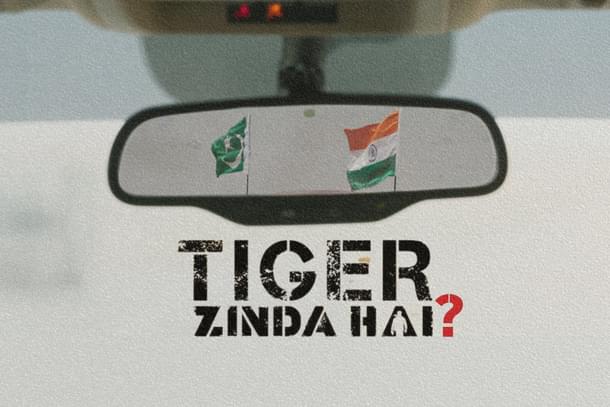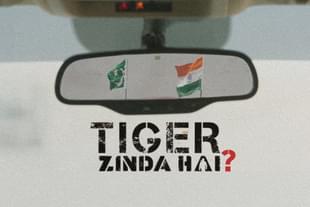Culture
When The Stars Dimmed — Public Fury Over Celebrities’ Silence On Operation Sindoor
K Balakumar
May 14, 2025, 01:30 PM | Updated May 16, 2025, 01:36 PM IST
Save & read from anywhere!
Bookmark stories for easy access on any device or the Swarajya app.


In the wake of India’s decisive military response to the Pahalgam terror attack orchestrated by the Pakistan-cultivated terrorists, India erupted in a wave of solidarity, pride, and grief. The armed forces, executing Operation Sindoor, struck deep into terror camps across Pakistan and Pakistan-occupied Kashmir (PoK), delivering what is widely hailed as a fitting response to the brutal killing of 26 innocent civilians.
On such occasions of emergency, the nation's heart bleeds. And in these moments of reckoning, it looks to its icons — not just for entertainment, but for empathy, solidarity, and strength. But this time, as India reeled from the shock and fury of Pakistan-backed terrorism, a conspicuous hush descended over the social media timelines of some of its celebrated film stars — Hindi and non-Hindi alike.
While the nation was united in grief and galvanising support for the armed forces, a bunch of celebrities, many of them A-listers, have chosen not to speak. No tweet. No post. No flag emoji. No tribute. Just silence. Its shamelessness echoing coldly in contrast to their volubility in times of vacuous film promotions or brand endorsements.
Public fatigue over selective activism
To be sure, a clutch of stars from the Hindi and South film industries posted messages of support, condemning terror and honouring the martyrs. But they were drowned out by the queasy quietude of the rest. And that silence, in today's charged climate, can be read to be anything between cowardice and complicity.
Across digital town squares, netizens are understandably fuming. Hashtags like #WhereAreTheStars, fuelled by disillusioned fans who otherwise worship these celebrities as cultural demi-gods, did their rounds. Lay fans and political commentators are quick to question the moral responsibility of public figures in times of national crisis. The general gist is: Why are they so loud during promotions of their films or projects, but utterly mute in moments of national crisis? The sub-text was: If they can endorse fairness creams and fizzy drinks with much passion, why not national issues of utmost importance?
Industry insiders suggest that some celebrities may be avoiding political controversy, wary of backlash from global audiences or future co-productions. Others fear trolling or ‘cancellation’ from the Leftist woke sections (with whom they are always hand-in-glove) who have no love lost for the idea of India.
As it happens, this isn't the first occasion that some well-known members of the film industry stand accused of selective silence. From Pulwama to Galwan, several celebrities have faced heat for delayed or diluted reactions. But this time feels different. There's a rawness in the air. And a fatigue too has set in with their selective performative activism. These same celebrities have time and space to voice their support for Palestinian and other global issues, but no squeak from them on India’s righteous counter-terror operation.
Kollywood and TN media not reading the room
Down South, especially in Tamil Nadu, things are even more dismal. Adding fuel to the fire is the pathetic partisan response of Tamil Nadu’s media ecosystem. Several prominent outlets in the State downplayed or side-lined national outrage in favour of local political narratives. In many cases, dubious and discredited ideological leanings seem to have dictated editorial choices — with more coverage given to fringe controversies than to the Indian military strikes.
While national media houses ran wall-to-wall coverage of the terror attacks and tributes to the martyrs, many regional platforms in TN offered muted or delayed responses, if at all. Some outlets focused on humanitarian concerns, questioning the impact of India’s strikes on civilians in Pakistan-occupied Kashmir. Others overtly downplayed the significance of the operation, choosing instead to highlight diplomatic tensions rather than the success of the military action. The members of the IT cell of the ruling party in the State did not even wince in putting out the enemy narrative. Such is their detestation of anything India and, by extension, anything Hindu.
The thing is nobody is asking them to toe the line of the ruling party at the Centre. The expectation is to just be sympathetic to the national cause. But the editorial standoffishness from TN media houses is a real cause for worry for the long-term interests of the country's cohesion. The contrast between national solidarity and regional scepticism shows that the Tamil Nadu’s media is out of sync with the broader national sentiment. It is, as the youngsters would have it, not reading the room.
However, it is no real surprise that many voices in the media in Tamil Nadu are flagrantly behaving like megaphones of the Dravidian camp, whose fervour for Indian causes are always tepid if not totally antagonistic. That’s why there’s such a hesitance to touch subjects that involve national security, especially if it doesn’t align with the ruling dispensation’s rhetoric.
Not just the media in the southern State, many leading lights of Kollywood too exposed themselves with their un-ennobling silence. Their compulsions from the local government were kind of understandable. But this moment could become a cultural flashpoint, as the country is now asking tough questions about loyalty, nationalism, and who gets to stay apolitical. The Tamil film industry may no longer get away with its own contradictions. The backlash will be intense against stars who have previously spoken out on 'global issues' but refrained from commenting on India’s counter-terror operations.
Curated silence is complicity
Nationalism and patriotism are difficult ideas to define. But stars, in general, must understand that millions hang on to their words. They shape fashion, opinion, and even elections. Their endorsements can make or break products; their tweets can sway sentiment. So when they stay silent in moments of national grief or crisis, it sends a message — intentional or not.
In a world where fame comes with a following and influence translates into impact, the lines between art, activism, and apathy are increasingly blurred. Silence isn’t neutral. It is just curated. In any case, stars can’t reap the rewards of influence and shrug off the responsibilities. They should know that their inconsistency — where virtue is outsourced to safer, western-approved causes — strikes a raw nerve with the Indian public, especially in an emotionally charged post-terror context.
Stars shirking moral responsibility
Communication specialists feel this moment may mark a turning point in how Indian audiences perceive stardom. The idea of the untouchable, apolitical celebrity is dying or already dead. In a hyper-connected, post-truth world, people demand alignment — not just with causes, but with country.
Of course, no law mandates a celebrity to speak. But public life isn’t governed by legality alone — it’s governed by perception, trust, and cultural capital. And right now, many feel that some of India’s biggest stars are cashing the cheques of fame but defaulting on the moral debt of responsibility.
As the nation salutes its martyrs and gears up for geopolitical consequences, it is also drawing a new line in the cultural sand: You can’t stand apart when the country is under attack.
Whether the silence is political caution, brand strategy, or genuine fear, the message from the public is crystal clear: If you can’t stand with us in grief, don’t expect our cheers in glamour.





